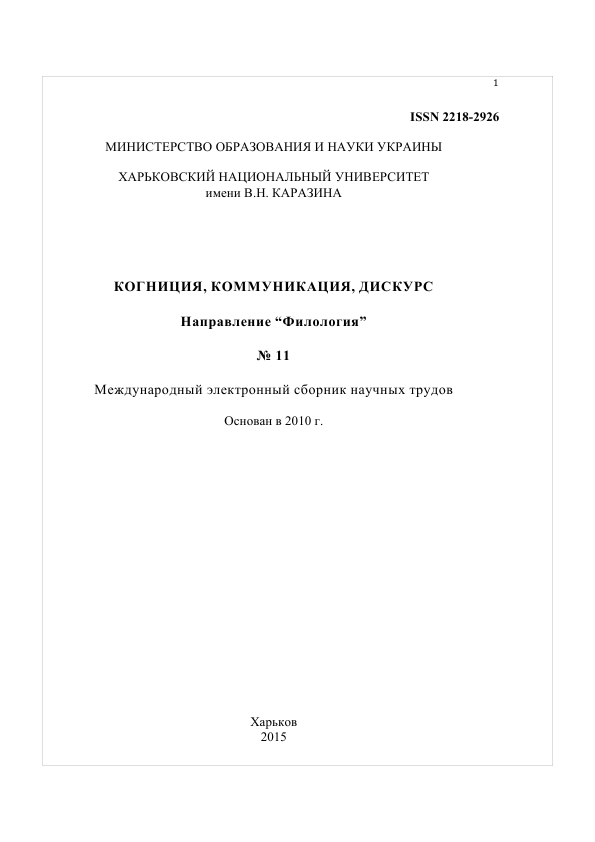Metamorphosis in Poetic Texts of the English Poetry of the 19–20th Centuries: Linguistic, Semiotic and Cognitive Perspective
Abstract
The article revealed linguosemiotic and linguocognitive properties of metamorphosis formation and functioning in the 19–20,h centuries English poetic texts on the basis of an integrated approach. I have revealed that the metamorphosis as a trope is syntactic-and-stylistic figure, with the helps conversion of the transformable into the transformed with a mandatory explication of the reasons for the change – its cause – and metamorphosis predicates which embody the idea of conversion, transformation, rebirth. The semiotic metamorphosis character is revealed by analyzing different codes represented in its verbal signs, and its cognitive character by reconstruction of the metamorphosis conceptual space. I have proved that the metamorphosis conceptual space consists of concepts, conceptual metaphors and metonymies. A comprehensive analysis of the functioning of the metamorphosis in the 19–20th centuries English poetic texts revealed text-forming, appellative, world- forming, space-forming, semiotic metamorphosis functions
Downloads
References
Biderman, G. (1996). Entsiklopediya simvolov. [Encyclopedia of Symbols]. Moscow: The Republic.
Bondarenko, Y.V. (2009). VREMJA kak lingvokognitivnij fenomen v anglojazichnoy kartine mira. [TIME as Linguistic and Cognitive Phenomenon in the English World Image]. Kharkov: Vasyl Karazin Kharkiv National University.
Dikareva, L.Y. (2003). Mifopoetika metamorphozi i sposobi yiyi objektivatsii u hudozhnomu movlenni: lingvosemiotichniy aspect (na materiali prozi N.V. Gogolya ta M.A. Bulgakova). Diss. kand. filol. nauk. [Mythopoetics of metamorphosis and ways of its representation in the language of prose in the lingual-semiotic perspective (based on the materials of N. Gogol’s and M. Bulgakov’s works). Cand. philol. sci. diss]. Kyiv. (in Russian).
Dunnett, A. (2015). Selected Poetry [Electronic Resource]. – Available from: http://www.alandunnett.co.uk.
Jacobson, R. (2000). Iz vospominaniy. [From the Remembrance]. Moscow: The Languages of the Russian Culture.
Krokhmalniy, R.O. (1997). Ukrainska romantichna poeziya 20 – 60 h rokiv XIX stolittya: modul` metamorphozi. Diss. cand. filol. nauk. [The Ukrainian Romantic Poetry of the 20-60th of the XIX Century: the Module of the Metamorphosis. Cand. philol. sci. diss]. Lviv. (in Ukrainian).
Lakoff, G. (2004). Metafory, kotorymi my zhivem. [Metaphors We Live By]. Moscow: URSS.
Lotman, Y.M. (2001). Semiosphera. [Semiosphere]. St-Petersburg: The Art.
Moskvichova, O.A. (2014). Metamorphoza u virshovanih textah anglijskoji poezii XIX-XX stolit`: lingvosemiotichniy ta lingvokognitivniy aspekti. Diss. cand. filol. nauk. [Metamorphosis in Poetic Texts of the English Poetry of the XIX-XXth Centuries: Linguistic, Semiotic and Cognitive Perspective. Cand. philol. sci. diss]. Kherson. (in Ukrainian).
Nechuy-Levitskiy, I. (2003). Svitoglyad ukrainskogo narodu. Eskiz ukrainskoyi miphologii. [The Viewpoint of the Ukrainian People. Sketch of Ukrainian Mythology]. Kyiv: The Guard.
Nikonova, V.G. (2008). Kontseptualniy prostir tragichnogo v pyesah Shekspira: poetico-kognitivniy analiz. Aftoref. diss. dokt. filol. nauk. [Conceptual Space of the Tragic in Shakespeare’s Plays: A Cognitive-Poetic Analysis. Author`s summary dr. philol. sci. diss]. Kyiv. (in Ukrainian). Poets` Corner. Selected Poetry [Electronic Resource]. – Available from: http://www.theotherpages.org/poet`scorner.
Potebnya, A.A. (1989). Slovo i mif. [Word and Myth]. Moscow: The Truth.
Slukhay, N.V. (2005). Etnokontsepti i mifologiya shidnih slovyan v aspekti lingvokultorologii. [Ethnic Concepts and Mythology of the Eastern Slavs in the Aspect of the Linguistic Culture]. Kyiv: Kyiv National University.
Stepanov, Y.S. (2004). Protey: ocherki haoticheskoy evolutsii. [Protey: the Sketch of the Chaotic Evolution]. Moscow: The Languages of the Slavic Culture.
V dvuh izmereniyah: Sovremennaya britanskaya poeziya v ruskih perevodah. (2009) [In Two Dimensions: The Modern English Poetry in the Russian Translation.]. Moscow: The New Literary Review.
Veselovskiy, A.N. (2011). Istoricheskaya poetika. [Historical Poetics]. St-Petersburg: The University Book.
Authors, who publish with this journal, accept the following conditions:
The authors reserve the copyright of their work and transfer to the journal the right of the first publication of this work under the terms of the Creative Commons Attribution License (CC BY), which allows other persons to freely distribute a published work with mandatory reference to the authors of the original work and the first publication of the work in this journal.
Authors have the right to enter into separate additional agreements for the non-exclusive dissemination of the work in the form in which it was published by this journal (for example, to post the work in the electronic institutions' repository or to publish as part of a monograph), provided that the link to the first publication of the work in this journal is given.
The journal policy allows and encourages the authors to place the manuscripts on the Internet (for example, in the institutions' repositories or on personal websites), both before the presentation of this manuscript to the editorial board and during review procedure, as it contributes to the creation of productive scientific discussion and positively affects the efficiency and dynamics of citing the published work (see The Effect of Open Access).




